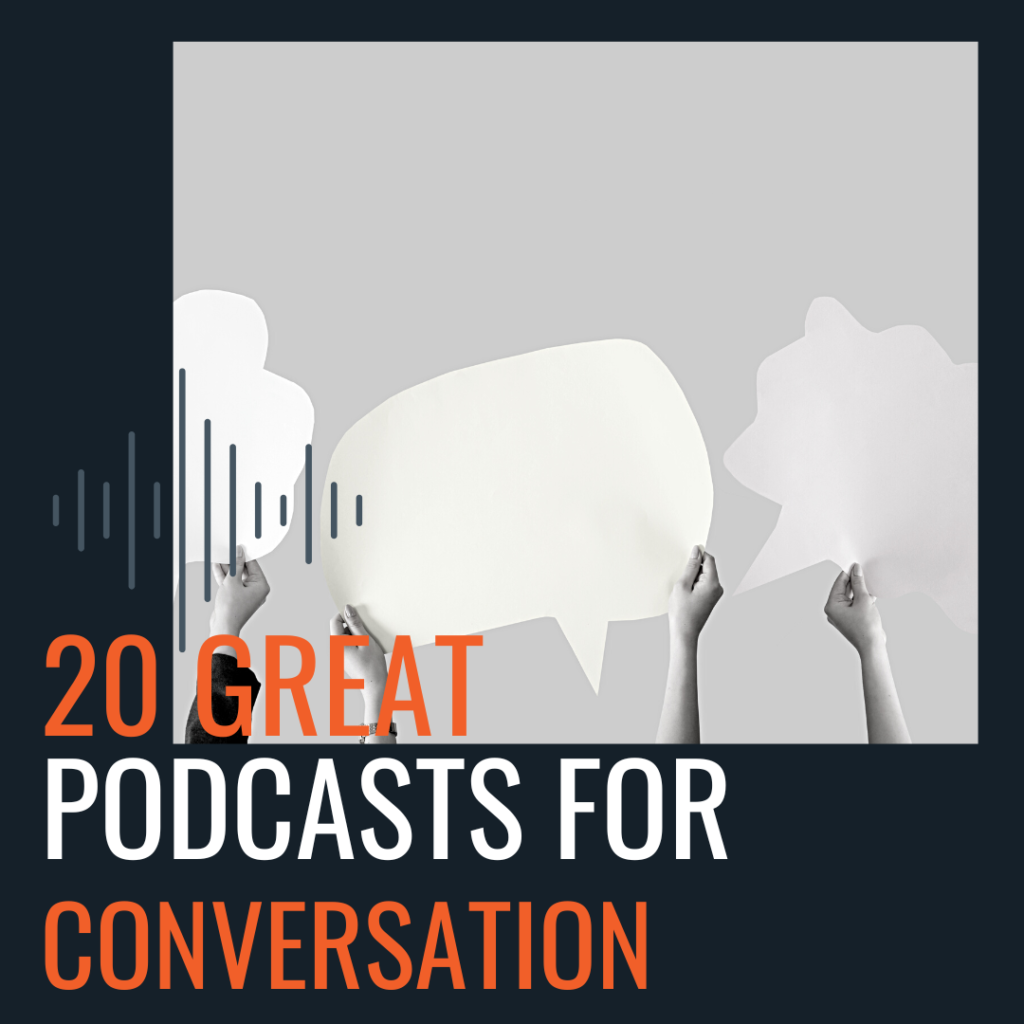
If someone told you that you had to give a talk in front of 1,000 people tomorrow, how would you feel?
Would you be up all night tossing and turning, scared about saying the wrong thing or maybe scared that you wouldn’t say enough?
One of the biggest fears out there, other than death, is the fear of public speaking.
About 40% of the US population is introverted, meaning they prefer minimal social interaction and gain their energy from being alone. So how do you prepare to give a talk when your nerves get the best of you?
First of all, historically, the most memorable speeches weren’t the ones that went the fastest or had the most words in them. Martin Luther King’s “I Have a Dream” speech was around 1,400 words. The Gettysburg Address at 272 words is shorter than most podcast introductions.
So, to nail the podcast, you don’t have to jam your interview full of words and ideas. And you definitely don’t have to speak at light-year speed. In podcasting, less is more.
While you won’t be directly speaking to 1,000 people when you do an interview, you can assume that you will have about 1,000 (maybe many more) listeners over time. There are three major areas, when done well, that will help you establish authority, trust, and genuine connection with your audience – and make it sound like there was never any stage fright in the first place.
3 Ways To Establish Authority With Your Audience and Overcome Podcast Stage Fright

1| Speak to a Person, Not a Podcast Audience
If you’ve taken a phone call, you can do a podcast interview. Yep, it’s that easy. Do you get super nervous when talking to your aunt Dora on the phone? No? Good!
In fact, thinking of the interview like a phone call is the ideal attitude to have about podcast guesting. You want the interview to be as personal as possible. What’s more intimate that a one-on-one call with someone? It should feel like you are overhearing two friends talking at Denny’s.
Have you ever been talked about while you’re in a room? People don’t like to be talked about when they are right beside you. It feels even weirder to not even acknowledge the person in the room that you are talking about. It’s a bit off-putting. But many times, this is how guests address the audience. They talk about them like they aren’t right there listening.
For example, the podcast guest is talking to the host and they say, “Your audience may be interested in my book.” News alert: although the audience isn’t typically there with you live, it feels live for them when they listen to the recording. For the audience, it feels as though they are in the room with you listening. There’s a better way to address them.
Instead, treat it like you are connecting with someone one on one. Use words like “You may like this book.” Rather than saying, “Your audience may be wondering,” say, “You may be wondering how to do this.” Those subtle nuances in language are very beneficial to aiding your stage freight and making the audience feel like they are being talked to, not at.
This also helps with your mind-set that you aren’t talking to a large audience. Using “you” phrases when you address the audience makes it feel as though you’re only talking to one person right in front of you.
Sometimes it’s a bit nerve-racking sitting there waiting for the host to hit record, imagining all the people that you might potentially be talking to. The reality is, you aren’t talking to anyone other than the host. So, keep your conversation focused on that. Keep your statements personal and not geared toward a larger, more general audience. Which brings us to the next point.

2| Make It Personal
When in doubt, use “you.”
Make all of your statements personal. Don’t talk about “them” or “they” or “those people in the world.” Talk to “you.” Using the general “you” directs your message to whomever is listening. That’s what the listeners want to hear.
Remember, when a listener puts the earbuds in their ears to listen to a podcast, the relationship is intimate. It is simply the podcast host, the guest, and the listener. So keep that in mind while you are speaking.
Want to take the personalization to the next level? Say “we,” “us,” or “our”. These pronouns bring the listener and host closer together, making the problems, struggles, and victories being discussed universal.
For example, here is a good line: “Maybe you’re just like me and we both need this to get our podcast interviews out there.”
Remember, talking to the people here and making each statement personal grounds you in the moment. It’s a reminder that what is seemingly a big interview is simply a personal conversation with a friend that is later shared with others. If you think about it this way, the stage fright and the nerves start to subside.
An interview isn’t something that you “don’t know how to do.” An interview is a conversation, and you’ve probably had plenty of those throughout the day of the podcast. You are experienced. You know how to do this.
A personal conversation, not an impersonal blast to the masses, goes a long way.
Reframing the interview this way can give you the confidence you need to overcome stage fright.

3| Slow Down!
Okay, okay, okay. So when we have stage fright, the number one thing we do is speak faster. It doesn’t build authority; rather, it oozes insecurity and the audience will notice. It shows that maybe you have somewhere else to be. Or maybe you just want to get it over and done with. When our voice speeds up, it also starts to waver.
The first thing to understand is that most podcasts are listened to sped up. Most listeners are playing at 1.5x or more normal speed, which makes it extremely hard to hear what you are saying if you are already talking too fast.
Besides, going too fast, racing from point to point, isn’t a good look. In the military, even when you’re late, you walk. Walking embodies more confidence and authority than frantically racing from one meeting to the next.
When you slow down, you also get more vocal awareness and power too.
Speaking faster lets you fit more words into your interview, but more words don’t get you understood. Do you yell to get someone to understand you? Or do you slow down, look people in the eye, and talk slower, softer?
If you think of the movie Dirty Harry, you can probably recall one of Clint Eastwood’s most famous lines: “Go ahead, punk. Make my day.” This line isn’t famous because of the length of his line or because he yells the phrase. The way Clint Eastwood says this line is deeply intentional. This line stands out, not because there are a lot of fancy gestures. It stands out because it’s said slowly, smoothly, and with intention. That’s what gives him the authority in the moment, and that’s what makes this line memorable for all of the viewers. Speaking slower has the power to make what you say more impactful!
Podcasting is different from radio. It is a conversation not bound by a clock, whereas radio is bound by time—limited segments and commercial breaks. So, podcasting allows you to really take your time (radio doesn’t). Sink into each word, sentence, and idea you share. You aren’t hurried by the next commercial break. There is nowhere to go.
When you are talking quickly, it sounds like a pathetic plea, not a conversation with a friend. We don’t use that frantic speed and tone when talking to a friend or family member. Don’t destroy the truth and authority you’ve built throughout a podcast by going fast or panicking at the end. Plus, your rushed speaking will be more pronounced against the podcast host, who likely doesn’t share in your stage freight. Or they at least have more practice in hiding it. Matching your rhythm to theirs will make the interview feel more genuine and natural to the audience.
While these three points won’t directly kick your stage fright to the curb, they will help you hide those fears from your audience. You will sound like a professional and exude confidence. And when we are able to repeatedly show up with an air of authority and ease, the things we once feared—like big speeches—actually become a lot easier.
Don’t let stage fright keep you from being the best guest, the guest you know you can be.
Looking For More?
Here are some other great resources.




